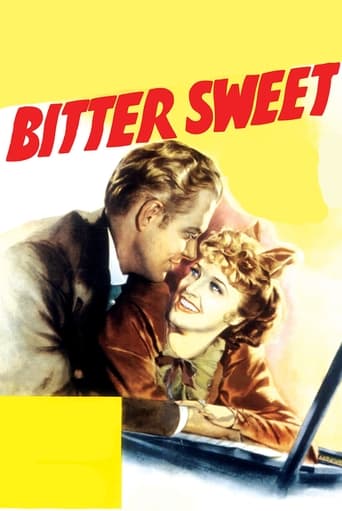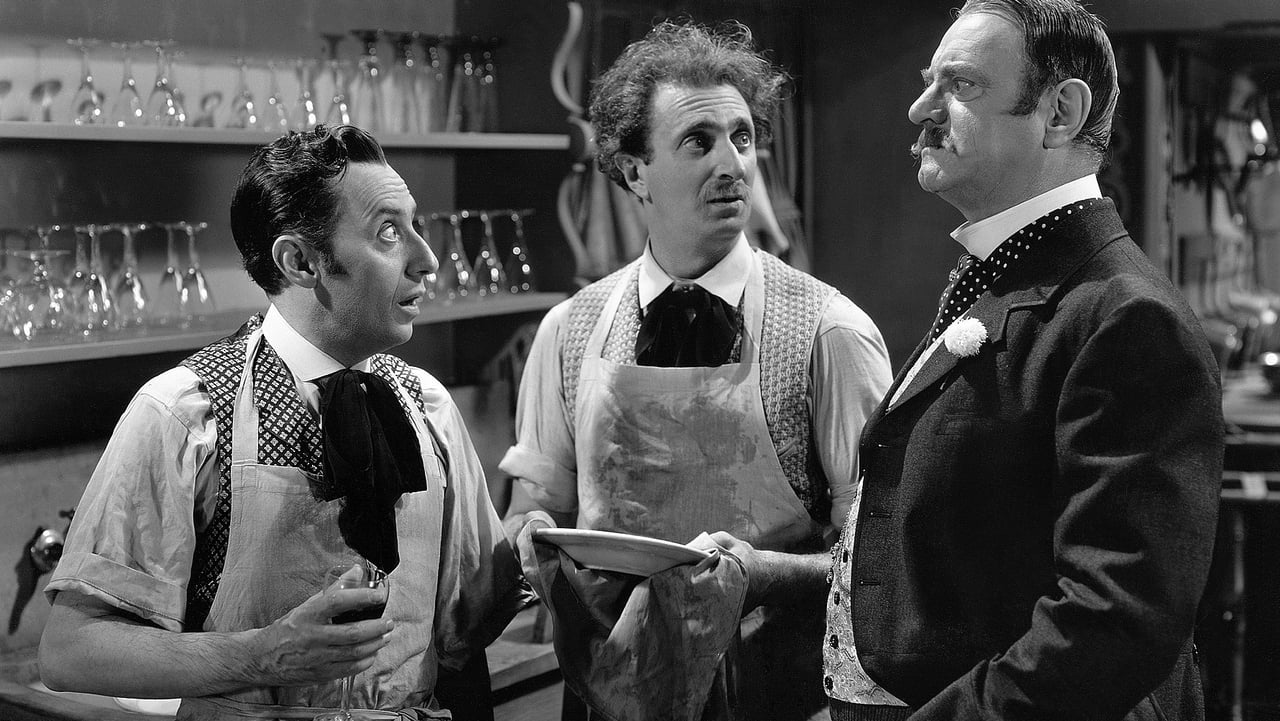jacobs-greenwood
Directed by W.S. Van Dyke, Noel Coward's play (treated by Lesser Samuels) and songs and the 1933 film was remade into this colorful costumer and musical romance drama for Jeanette MacDonald and Nelson Eddy (fans). It received Oscar nominations for its Color Art Direction and Cinematography. The cast also includes George Sanders, Ian Hunter, Felix Bressart, Sig Ruman, Veda Ann Borg, and Herman Bing (among others).In London, 1891, hopelessly romantic Sarah Millick (MacDonald) skips out of her arranged marriage to elope with her penniless Viennese music tutor Carl Linden (Eddy), much to the dismay of her mother (Fay Holden), her dullard foreign minister fiancé Harry (Edward Ashley), and his mother Lady Daventry (Janet Beecher), though her friend Dolly (Lynne Carver) is delighted. Carl & Sari (as he calls her) immediately leave for Vienna where, after she has a chance meeting with Baron Von Tranisch (Sanders), the couple is greeted enthusiastically by Carl's friends Ernst (Curt Bois) and Max (Bressart). The celebration is continued, later, at Mama Luden's (Greta Meyer) restaurant.After a year, the Lindens are still happy and poor. Sari begins to write a letter home to ask for money, but instead ends up offering her services as a singing tutor to a market keeper (Bing) for food. Unable to sell his completed operetta, Carl ends up inadvertently bungling her arrangement. Ernst & Max, who have a penchant for pawning Carl's possession for food & drink, have an idea - play outside the baths in Bonn in hopes of attracting a millionaire's ear. The four of them do just that and, hearing Sari sing Carl's operetta, British Lord Shayne (Hunter) believes that it brings him luck in his card game with the Baron and others. He sends them money to continue but, after the Baron loses to Shayne, he looks out the window and recognizes pretty Sari. The Baron then sends a messenger to take the makeshift band away, to a job working at Herr Schlick's (Ruman) café.Schlick doesn't know what to do with the players until he sees Sari, then he hires her & the others and fires Manon (Borg, barely in two scenes), who'd been the Baron's previous mistress. Even though Sari is never asked to sing, she & Carl are oblivious to the arrangement between Schlick and his regular customer the Baron, who insists that the café owner keep his mistresses employed for his (own purposes &) excellent patronage. When by chance, Harry Daventry visits with his wife Jane (Diana Lewis), the Baron's arrangement becomes clear to Sari, who then quits Herr Schlick. The Baron is naturally furious with the café owner when he learns that his new mistress won't be dining with him, but Schlick tells dishwashers Ernst & Max that the famous (producer?) Herr Wyler (Charles Judels) will be coming to his café that night. The friends tell Sari of it and, seeing a chance to sing Carl's operetta for him, she joins a surprised Carl (who plays the piano there) at Schlick's. But it is Schlick that is surprised when he learns that Wyler really is there, brought by Lord Shayne to hear Sari sing. Just as she's completed singing the operetta, the drunken Baron accosts her, initiating a fatal duel between the master military swordsman and poor Carl.But the show must go on. Sari refuses Harry & Jane's offer to return to London with them; her home is now the place that Carl loved, Vienna. With Wyler and Shayne's help, Carl's opera is produced, performed by Sari to great success, one which is "bitter sweet".The film ends with a fantasy sequence much like an earlier MacDonald/Eddy vehicle, Maytime (1937), does.
jotix100
No wonder Noel Coward had such low esteem of what Hollywood could do to his plays. Judging by what comes out on "Bitter Sweet", Mr. Coward had a case. The problem seems to be in the adaptation of the material. Lesser Samuels took too many liberties with the musical, and in a lot of ways, it seems this is a rework of "Maytime", as other contributors to this forum have expressed.The film had all the right elements going for it, but somehow, this typically English musical is anything but English. W. S. Van Dyke, a director who worked extensively in the genre doesn't appear to have been inspired by the material. MGM gave this film its usual lavish production, yet, this Technicolor film lacks some of the magnificent look the studio gave "Maytime", a black and white movie.Jeanette MacDonald has a bigger role than her co-star. She also has a more passable British accent, whereas Mr. Eddy, who is supposed to be Austrian, doesn't sound credible. George Sanders is seen as the Baron Von Tranisch, a cad who has an eye for spotting good looking women. Ian Hunter, Sig Rumann, and others are seen in supporting roles."Bitter Sweet", while enjoyable, is not one the best films the singing stars duo did for MGM.
bkoganbing
A previous reviewer reported the well known story about how upset Noel Coward was at this version of his work that he refused to allow Hollywood to do another adaptation of any of his works. Hollywood in fact never did.Of course you'd have to have something to compare it to and I hope that TCM manages to find the 1933 version that Anna Neagle and Fernand Gravey did for the British cinema.On its own Bitter Sweet is a mixture of the previous MacDonald/Eddy triumph Maytime with a good hunk of Anna Karenina thrown into the mix. Jeanette MacDonald on an impulse runs off with her music teacher Nelson Eddy to gay old Vienna where they live on love and starve a good deal of the time. In doing the elopement she jilts her fiancé, proper and stuffy Edward Ashley who's an up and coming man in their Foreign Office.I'm sure Noel Coward didn't complain about what Jeanette and Nelson did vocally with his songs because they're sung beautifully. Jeanette is barely passable for British and Nelson is about as Viennese as John Wayne. MGM knew that and surrounded them with the German colony of Hollywood, Sig Rumann, Curt Bois, Felix Bressart, and Herman Bing. And George Sanders is his usual caddish self as the Baron Von Trannisch who's got a lustful eye for Jeanette.Noel Coward's plays are comedies of manners with some satirical jibes at British society. His music is universal, but his wit is for the British Isles. I doubt he could have written a western. My guess is that that was what Coward objected to in this film.Still Jeanette and Nelson fans will like it and until someone at TCM finds the Anna Neagle version that's all we're likely to see.
jwkenne
Noel Coward, who wrote both the words and the music of the original 1929 operetta, called this movie "a nauseating hotchpotch of vulgarity, false values, seedy dialogue, stale sentiment, vile performances, and abominable direction." He found it so offensive that he never again allowed Hollywood to have anything to do with his musicals, and put a clause in his will to that effect.I entirely agree with his evaluation. No one who has had the chance to see the brilliant and heartbreaking original play can look on this bastard tinsel and frou-frou offspring without feeling first incredulity, then disgust, and finally a deep personal hatred for everyone involved in the nasty thing.By the way, the connection between this movie and "Maytime" is complicated. You see, some Hollywood suit didn't like the original show, "Maytime", but wanted to use the title, and so they ripped off the plot of "Bitter Sweet" and combined it with lots of songs that aren't from either "Maytime" or "Bitter Sweet", apart from just one actual "Maytime" song, and called the result "Maytime". (Eddy and MacDonald's movie called "The Chocolate Soldier", similarly, is the plot of the play, "The Guardsman", mixed with some of the songs from "The Chocolate Soldier", but none of the plot.) So when they decided to make "Bitter Sweet", they kept the same basic plot, but dumbed it down, creating this abortion.



 AD
AD




